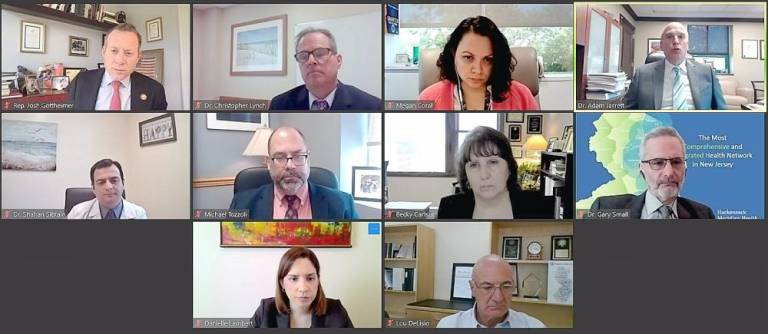Low self-esteem, anxiety and depression
North Jersey. Youth mental health roundtable addresses rise in issues stemming from COVID-19 Pandemic

U.S. Congressman Josh Gottheimer recently hosted a roundtable of North Jersey doctors, medical professionals, counselors, educators and parents to address the rise in youth mental health issues caused by the COVID-19 pandemic and more than a year of remote learning and social distancing.
According to current estimates — 1 in 5 people — including more than one million people total in New Jersey — have been diagnosed with a mental illness. During the past year of the pandemic, the CDC reported a rise in mental health emergency room visits by 24% and 31% in children 5-11 years and 12-17 years old, respectively, from January to October of 2020.
The challenges of the pandemic have had an acute impact on North Jersey’s children and students, who — without regular school, activities, sports teams, and other routines — have lost normal social interactions.
Children suffering from mental illnesses can face barriers to learning, academic achievement, and performance on standardized academic tests. In the most serious situations, it can also put them in danger.
“Through my work both in Congress and here at home throughout the pandemic, I’ve seen and heard first-hand how this public health and economic crisis has been causing an historic wave of mental health issues. Our students have missed out on seeing their friends, playing on their sports teams, going to birthday parties, school dances, and graduations; and the pandemic has totally disrupted their routines and kept them out of the classroom for much of the past year,” Gottheimer said. “That is why I have brought together this group of medical professionals, counselors, educators, and parents to discuss how we can improve the mental health of the children in our community.”
“I applaud Congressman Gottheimer for assembling the roundtable panel today so that we could address the mental health crisis among New Jersey’s youth,” said Adam Jarrett, MD, chief medical officer at Holy Name Medical Center. “We know COVID-19 has triggered an even greater need for this conversation, given what providers across the state are seeing in their emergency rooms as a result of the isolation many young people have faced this past year, in addition to some of the underlying issues that existed prior to the pandemic. Most importantly, we talked about solutions and opportunities to provide support and training - not only to parents and teachers - but caregivers and healthcare providers as well.”
“Ongoing education, guidance and support are key to improved mental health. That is why we continue to collaborate with our local schools, community organizations and governmental agencies, to develop prevention and support programs rooted in promoting healthy lifestyles for children and adults living in our community,” said Danielle Lambert, LCSW, Behavioral Health Manager, Englewood Health.
“The COVID-19 restrictions, along with the lack of regular activities, school interaction and social contact has exacerbated pre-existing conditions of low self-esteem, anxiety and depression, along with affecting the natural life stage progression of adolescents to have the ability for important self-identity development. We continue to share and promote mental health awareness and education along with a variety of programs and services within the community for educators, parents and caregivers to utilize, while encouraging them to reach out for assistance for themselves and their children,” said Becky Carlson, Executive Director, Center for Prevention & Counseling.
“As we move forward managing the mental health crisis for our youth, we need to focus on integrated health care, vaccination, and an increase in services to meet the growing need,” said Dr. Shahan Sibtain, Chief Psychiatrist, Bergen New Bridge Medical Center.
“This pandemic has brought the mental health challenges of children and adolescents to a crisis level. Educators, parents, and policy makers need to know that the widespread stigma about mental illness is unwarranted. Depression, anxiety, and other common problems can be treated effectively, but we need to recognize the symptoms and offer the services that our youth deserve,” said Gary W. Small, M.D., Chair of Psychiatry, Hackensack University Medical Center; Physician in Chief, Behavioral Health Care Transformation Services, Hackensack Meridian Health.
“Focusing on children’s mental health may be the most important thing any of us can spend time on right now. Our kids are struggling and we need to all collectively work together to help,” Michael Tozzoli, MSW, LCSW, CEO of West Bergen Mental Healthcare.
“Mental health is the same as medical health, so mental health care has to become part of all health care,” Christopher Lynch, Ph.D., Psychologist; Director Pediatric Behavioral Medicine, Goryeb Children’s Hospital/Atlantic Health System-Children’s Health.
“Parents can help their children by modeling self-care as well as creating routines at home. Routines provide stability and consistency in a time where there is so much uncertainty,” Megan Coral, MS, LMFT, Therapist, Valley Medical Group.